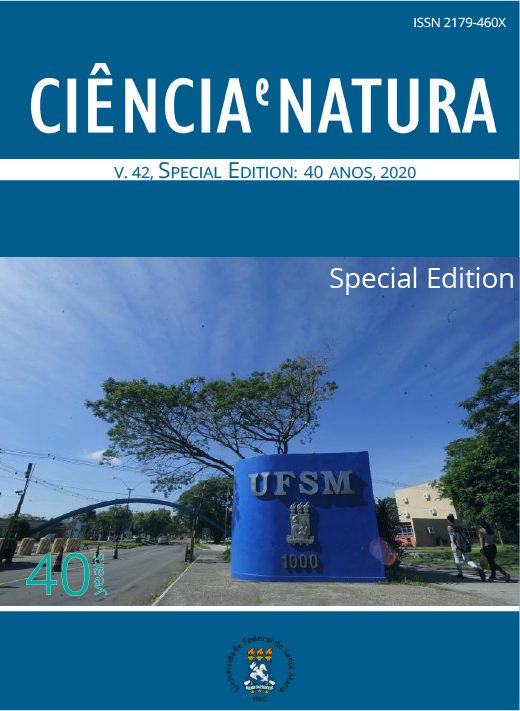Effects of land use change on discharge of the Paraíba do Sul river
DOI:
https://doi.org/10.5902/2179460X40832Palavras-chave:
Land-use changes, hydrological modeling, riparian vegetationResumo
The Paraíba do Sul river basin is located in the southeast region of Brazil and across São Paulo, Rio de Janeiro and Minas Gerais states. In addition to the urban and rural population in the basin, Paraíba do Sul River supplies about twelve million people in the Metropolitan Region of Rio de Janeiro, the third-largest metropolitan region in South America. Land-use in the basin is predominantly dairy farming, where inadequate soil management has affected the quality and quantity of water in the basin. In this work, a distributed hydrological model was performed to assess different surface coverage scenarios considering increments of forest cover along to the basin watercourses. The scenarios were compared with the current condition of the basin in terms of annual mean streamflow, annual maximum daily streamflow, and frequency of occurrence of very high and very low flow extremes. The simulations indicate a reduction in the annual mean streamflow rate due to the increase of the cover forest; reduction of annual maximum daily streamflow due to the increase in forest cover. Extreme frequency analysis indicates that increasing forest cover promotes a decrease in very high flow events and an increase in very low flow events during the rainy months of the basin (October to March), however, in the dry months (especially in August) the occurrence of very high flow events increases while very low flow events decrease. These results indicate that although on average and during the rainy season forest cover negatively affects surface water availability in the driest months, when water resources are scarcer, increased forest cover is beneficial for water availability in the basin.Downloads
Downloads
Publicado
Como Citar
Edição
Seção
Licença
Para acessar a DECLARAÇÃO DE ORIGINALIDADE E EXCLUSIVIDADE E CESSÃO DE DIREITOS AUTORAIS clique aqui.
Diretrizes Éticas para Publicação de Revistas
A revista Ciência e Natura está empenhada em garantir a ética na publicação e na qualidade dos artigos.
A conformidade com padrões de comportamento ético é, portanto, esperada de todas as partes envolvidas: Autores, Editores e Revisores.
Em particular,
Autores: Os Autores devem apresentar uma discussão objetiva sobre a importância do trabalho de pesquisa, bem como detalhes e referências suficientes para permitir que outros reproduzam as experiências. Declarações fraudulentas ou intencionalmente incorretas constituem comportamento antiético e são inaceitáveis. Artigos de Revisão também devem ser objetivos, abrangentes e relatos precisos do estado da arte. Os Autores devem assegurar que seu trabalho é uma obra totalmente original, e se o trabalho e / ou palavras de outros têm sido utilizadas, isso tem sido devidamente reconhecido. O plágio em todas as suas formas constitui um comportamento publicitário não ético e é inaceitável. Submeter o mesmo manuscrito a mais de um jornal simultaneamente constitui um comportamento publicitário não ético e é inaceitável. Os Autores não devem submeter artigos que descrevam essencialmente a mesma pesquisa a mais de uma revista. O Autor correspondente deve garantir que haja um consenso total de todos os Co-autores na aprovação da versão final do artigo e sua submissão para publicação.
Editores: Os Editores devem avaliar manuscritos exclusivamente com base no seu mérito acadêmico. Um Editor não deve usar informações não publicadas na própria pesquisa do Editor sem o consentimento expresso por escrito do Autor. Os Editores devem tomar medidas de resposta razoável quando tiverem sido apresentadas queixas éticas relativas a um manuscrito submetido ou publicado.
Revisores: Todos os manuscritos recebidos para revisão devem ser tratados como documentos confidenciais. As informações ou ideias privilegiadas obtidas através da análise por pares devem ser mantidas confidenciais e não utilizadas para vantagens pessoais. As revisões devem ser conduzidas objetivamente e as observações devem ser formuladas claramente com argumentos de apoio, de modo que os Autores possam usá-los para melhorar o artigo. Qualquer Revisor selecionado que se sinta desqualificado para rever a pesquisa relatada em um manuscrito ou sabe que sua rápida revisão será impossível deve notificar o Editor e desculpar-se do processo de revisão. Os Revisores não devem considerar manuscritos nos quais tenham conflitos de interesse resultantes de relacionamentos ou conexões competitivas, colaborativas ou outras conexões com qualquer dos autores, empresas ou instituições conectadas aos documentos.






